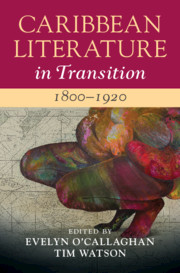Book contents
- Caribbean Literature in Transition, 1800–1920
- Caribbean Literature in Transition
- Caribbean Literature in Transition, 1800–1920
- Copyright page
- Contents
- List of Illustrations
- Contributors
- Acknowledgements
- Introduction
- Part I Literary and Generic Transitions
- Part II Cultural and Political Transitions
- Chapter 8 John Jacob Thomas and the Grammar of Freedom
- Chapter 9 How Barbados Transformed Radical British Author Eliza Fenwick into a Reactionary
- Chapter 10 Mary Seacole’s Travels and Tales
- Chapter 11 Genealogy and Nonhistory in Adolphus, A Tale
- Chapter 12 Obeah, Religion, and Nineteenth-Century Literature of the Anglophone Caribbean
- Part III The Caribbean Region in Transition
- Part IV Critical Transitions
- Bibliography
- Index
Chapter 9 - How Barbados Transformed Radical British Author Eliza Fenwick into a Reactionary
from Part II - Cultural and Political Transitions
Published online by Cambridge University Press: 16 December 2020
- Caribbean Literature in Transition, 1800–1920
- Caribbean Literature in Transition
- Caribbean Literature in Transition, 1800–1920
- Copyright page
- Contents
- List of Illustrations
- Contributors
- Acknowledgements
- Introduction
- Part I Literary and Generic Transitions
- Part II Cultural and Political Transitions
- Chapter 8 John Jacob Thomas and the Grammar of Freedom
- Chapter 9 How Barbados Transformed Radical British Author Eliza Fenwick into a Reactionary
- Chapter 10 Mary Seacole’s Travels and Tales
- Chapter 11 Genealogy and Nonhistory in Adolphus, A Tale
- Chapter 12 Obeah, Religion, and Nineteenth-Century Literature of the Anglophone Caribbean
- Part III The Caribbean Region in Transition
- Part IV Critical Transitions
- Bibliography
- Index
Summary
The narrative arc of this essay takes British author Eliza Fenwick (1766–1840) from her abolitionist, progressive life in Britain in the 1790s to slave-dependent Barbados, where she ran a school for girls between 1815 and 1822. To riff on the title of Marilyn Butler’s 1982 Romantics, Rebels and Reactionaries, Fenwick moved from 'rebel' to 'reactionary' in her transatlantic journey from the political centre to the colonial margins. Despite being steeped in the revolutionary politics of the late Enlightenment, when Fenwick arrived in Barbados in late 1814, despite her abolitionist politics, she could not understand the 'cunning and ingenuity' of the actual enslaved people she encountered, just prior to Bussa’s Rebellion. By using the critical frameworks developed by scholars such as Hilary Beckles and Pedro Welch to analyse the resistance strategies used by the enslaved people Fenwick would have encountered in Barbados at the time, I explain what Fenwick could not.
- Type
- Chapter
- Information
- Caribbean Literature in Transition, 1800–1920 , pp. 151 - 167Publisher: Cambridge University PressPrint publication year: 2021

